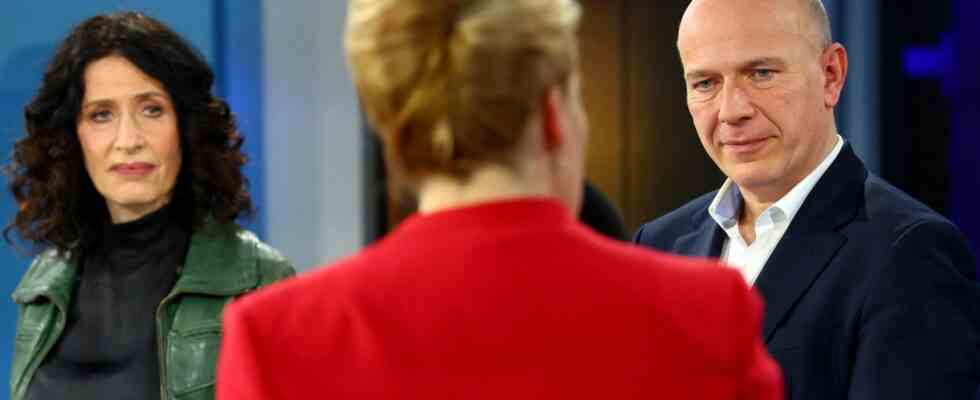analysis
Status: 02/13/2023 08:28 a.m
The CDU wins the election in the capital, but has no government partners for the time being. The SPD loses a lot, but does not want to give way. The Berliners, on the other hand, really don’t want a government at all.
Three lead candidates, all losing their respective constituencies. A governing mayor leading her party to the worst election result in Berlin’s history. And a downright devastating verdict by the voters about the short term in office of the incumbent Senate. On paper, the result of the Berlin repeat election is clearly a red-green-red defeat. After just over a year in government, SPD top candidate Franziska Giffey has once again worsened her already historically poor election result of 2021.
On the other hand, there is a clear winner. In a short but intense election campaign, the CDU apparently not only focused on the right issues, but also hit the right tone: that of anger at a city that doesn’t seem to be working. The fact that CDU top candidate Kai Wegner had to listen to the accusation of using aggressive rhetoric to divide, especially after New Year’s Eve, will not matter to him. According to Wegner, the search for a new government could only begin with him and the Christian Democrats.
But in reality, this election result is like so many things in Berlin: more complicated than you think.
Lars Klingbeil, Federal Chairman of the SPD, on the historic defeat of the SPD after the Berlin elections
Morning magazine, February 13, 2023
Not even a third wants black and red
“Berlin has chosen the change,” Wegner announced to jubilation on the evening of the election. In fact, however, the majority of Berliners reject any of his possible coalition options. Not even a third of the population wants a CDU-SPD coalition, and a black-green alliance would have even less support. Wegner’s CDU wanted only 36 percent of those from infratest dimap Respondents at the head of the next Berlin government see. It is cold consolation that the governing parties fare even worse on this issue.
It sounds paradoxical, but Berliners are extremely dissatisfied with the red-green-red Senate – but they don’t want anyone else either. Greens lead candidate Bettina Jarasch was able to confidently announce on the evening of the election: “The current governing coalition has a clear and stable majority.”
There is hardly an issue that divides them as much as transport policy
However, this statement is only half true. Because a look at the political map of Berlin shows that the federal capital is deeply divided. While the green majority votes within the S-Bahn ring, the CDU dominates outside the ring. And there is hardly an issue that separates these two worlds as much as transport policy: cyclists in inner-city neighborhoods versus motorists in the outskirts. While some talk about climate change and swear by public transport, others are stuck in traffic every day because buses and trains are not an option for them due to a lack of connections or permanent construction sites.
This division of Berlin into two sometimes very opposite worlds makes it much more difficult to form a government, especially for the CDU and the Greens. Even the question of whether Autobahn 100 should be extended to north-east Berlin could break a black-green coalition.
The SPD as a junior partner of the CDU?
The CDU, on the other hand, has much more in common with the SPD, especially when it comes to housing construction, which is so important in Berlin. But it is doubtful that the Social Democrats will allow themselves to be demoted to junior partners – especially not after the painful GroKo experiences of the past.
However, a lot will also depend on the woman who is and wants to remain Berlin’s first governing mayor. “A year is short if you deal with three crises at the same time and have a repeat election,” said the visibly exhausted SPD top candidate on election night. Corona crisis, refugee crisis, energy crisis: the red-green-red Senate has hardly experienced normality since the botched 2021 election.
The balance sheet of the Giffey Senate is not as disastrous as the election result might suggest: The economy is doing better and better, the refugee crisis has been mastered surprisingly well so far and the aid measures for households and companies that no longer pay their energy costs can, came faster in Berlin than anywhere else. The 29-euro ticket pushed through by Giffey is selling like hot cakes, and even the reform of the notoriously overburdened Berlin administration is making headway – albeit slowly.
However, it is questionable whether that will be enough for Giffey to assert her claim to leadership again. Ultimately, the continuation of the red-green-red coalition also depends on whether Franziska Giffey draws personal conclusions from the election debacle.
In any case, the formation of a government in Berlin after the repeat election will not be easy. No one can predict how long it will last. It is quite possible that there will still be negotiations when the Federal Constitutional Court decides whether it will still accept the complaints against the repeat election.

